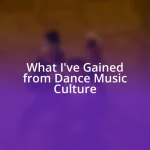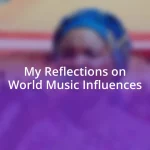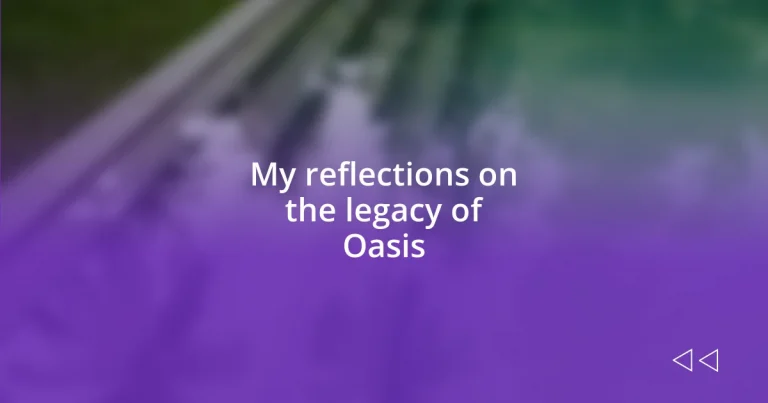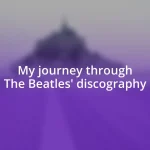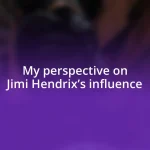Key takeaways:
- Oasis significantly influenced the music landscape and cultural identity of the ’90s, embodying themes of youth, rebellion, and unity through their songs.
- Key albums like “Definitely Maybe,” “(What’s the Story) Morning Glory?” and “Be Here Now” showcased their evolution from raw energy to a more polished sound, reflecting the personal growth of listeners.
- Their legacy continues to inspire future generations, promoting authenticity and serving as a bridge across time through iconic anthems that foster shared experiences and self-expression.
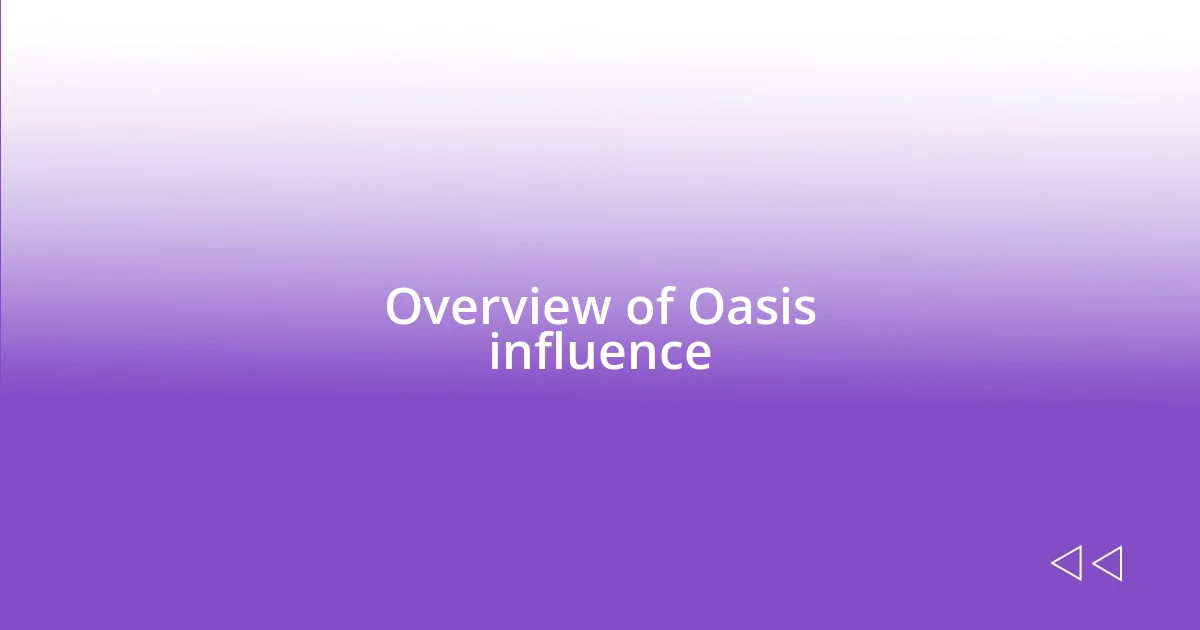
Overview of Oasis influence
Oasis has undoubtedly left a profound mark on the music landscape, influencing bands across generations. I still remember the first time I heard “Wonderwall” during a road trip with friends. That moment captured the essence of nostalgic youth—didn’t we all believe we’d find something extraordinary in life, just like the song suggested?
Their impact isn’t limited to just catchy tunes; it extends to their embodiment of the ’90s Britpop culture. I often reflect on the sense of unity their music brought to people. Seeing massive crowds singing “Don’t Look Back in Anger” at concerts was nothing short of electrifying. It made me wonder: how many times have songs served as a soundtrack to our own collective experiences?
Oasis also pushed the boundaries of what it meant to be a rock band. They weren’t just musicians; they were cultural icons, sparking conversations about identity and class. I recall a friend passionately debating the significance of their lyrics, and it struck me—how often does music spark deeper discussions beyond just the notes? Their legacy has given us more than just songs; it has ignited a cultural movement that continues to inspire artists today.
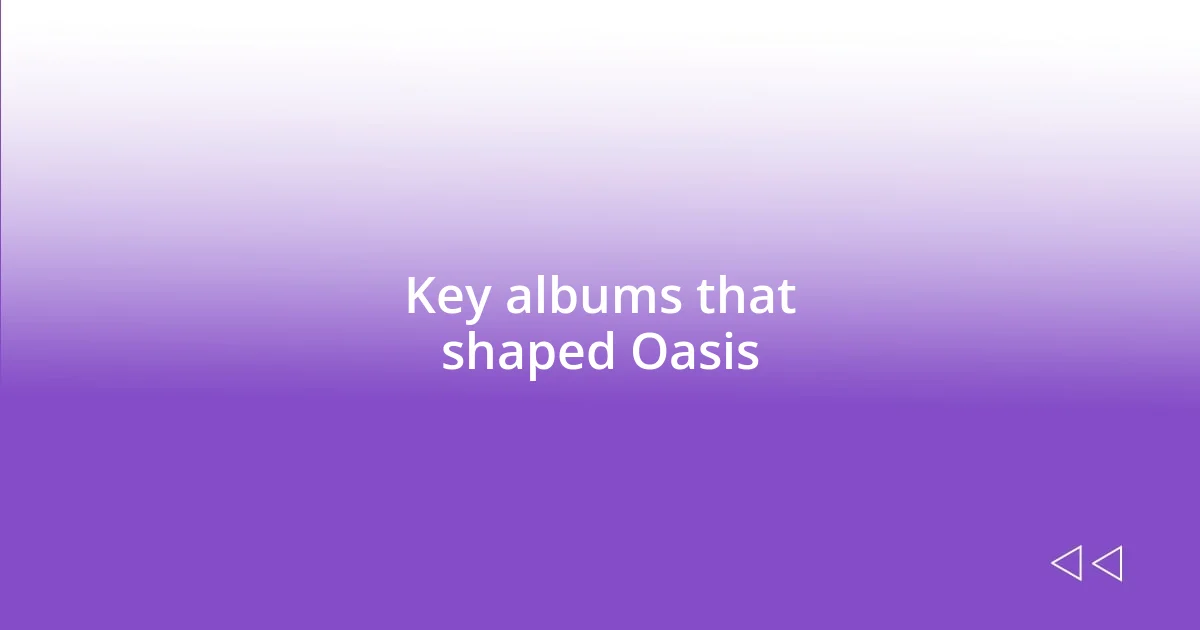
Key albums that shaped Oasis
To understand the legacy of Oasis, we must delve into their key albums that shaped their sound and the landscape of rock music. “Definitely Maybe” was their explosive debut, bursting with youthful energy and defiance. I still vividly remember the thrill of hearing “Supersonic” for the first time; it felt like an anthem for everyone who ever felt misunderstood. The raw emotion captured in this album resonated with countless fans and set the stage for the Britpop movement.
Moving on to “(What’s the Story) Morning Glory?”, this album solidified their place in music history. Tracks like “Champagne Supernova” evoke memories of rainy afternoons where I’d put on my headphones and escape into the rich melodies. It’s incredible how this album captures both the highs and lows of life, reflecting universal themes that many can relate to. I often wonder if songs like these are the reason why teenagers connect so deeply with music; they create a sense of belonging that’s hard to describe.
Finally, let’s not overlook “Be Here Now,” an album that, while polarizing, showcased their willingness to evolve. I can recall a summer night spent with friends, blasting “D’You Know What I Mean?” at a backyard BBQ. Despite its mixed reviews, for many of us, this album encapsulated the spirit of those carefree days. Oasis wasn’t just about the music; they were a soundtrack to our lives, reminding us that it’s okay to seek greatness but also to embrace our imperfections.
| Album | Year Released |
|---|---|
| Definitely Maybe | 1994 |
| (What’s the Story) Morning Glory? | 1995 |
| Be Here Now | 1997 |
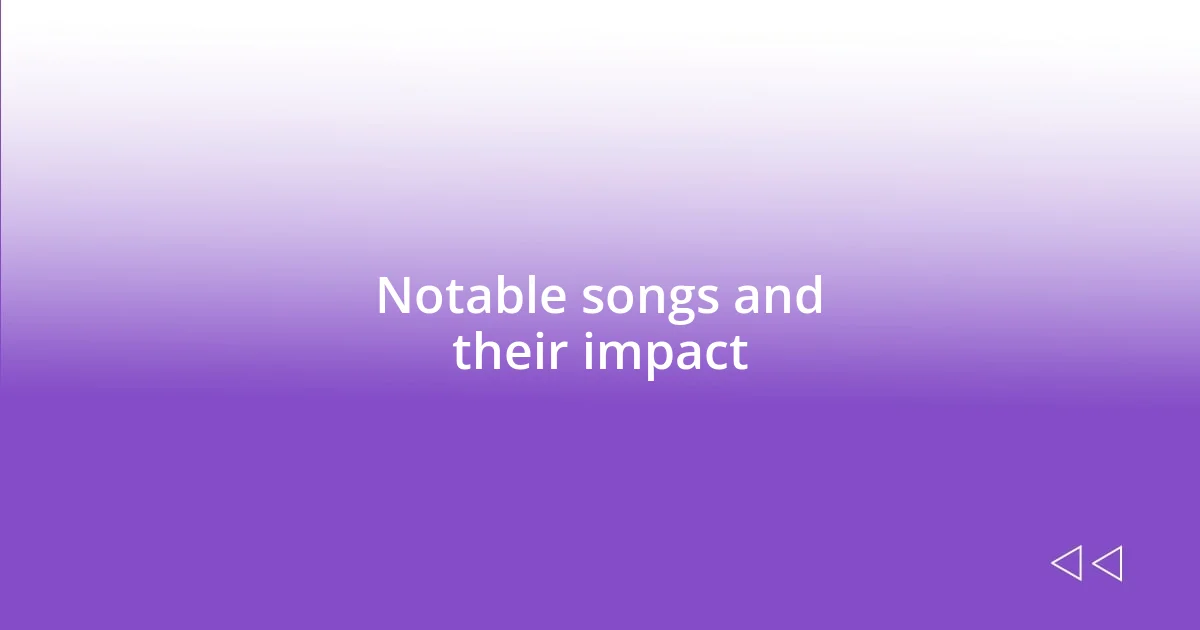
Notable songs and their impact
Their songs have resonated deeply, becoming anthems for countless fans who found solace in their lyrics. When “Wonderwall” played on the radio during my teenage years, I felt an undeniable connection—it was as if the song spoke directly to my dreams and insecurities. Each strum of the guitar seemed to echo the romanticism of young love, evoking emotions that still linger with me today.
Notable songs and their impact:
- “Don’t Look Back in Anger”: A powerful message of resilience that inspired a generation to embrace forgiveness, reminding us to let go rather than dwell on past grievances.
- “Champagne Supernova”: Its hauntingly beautiful melodies evoke nostalgia, often transporting listeners back to moments of carefree youth and reflection.
- “Roll with It”: An uplifting anthem that encouraged a positive mindset, reminding me of the joyous spontaneity of life, especially during carefree summer evenings with friends.
These tracks not only defined an era but also shaped my understanding of emotional expression in music. I can still recall singing along to “Some Might Say” with friends during road trips, our voices harmonizing over the thrill of adventure—a moment that reinforced the idea that music is woven into the very fabric of our shared experiences.
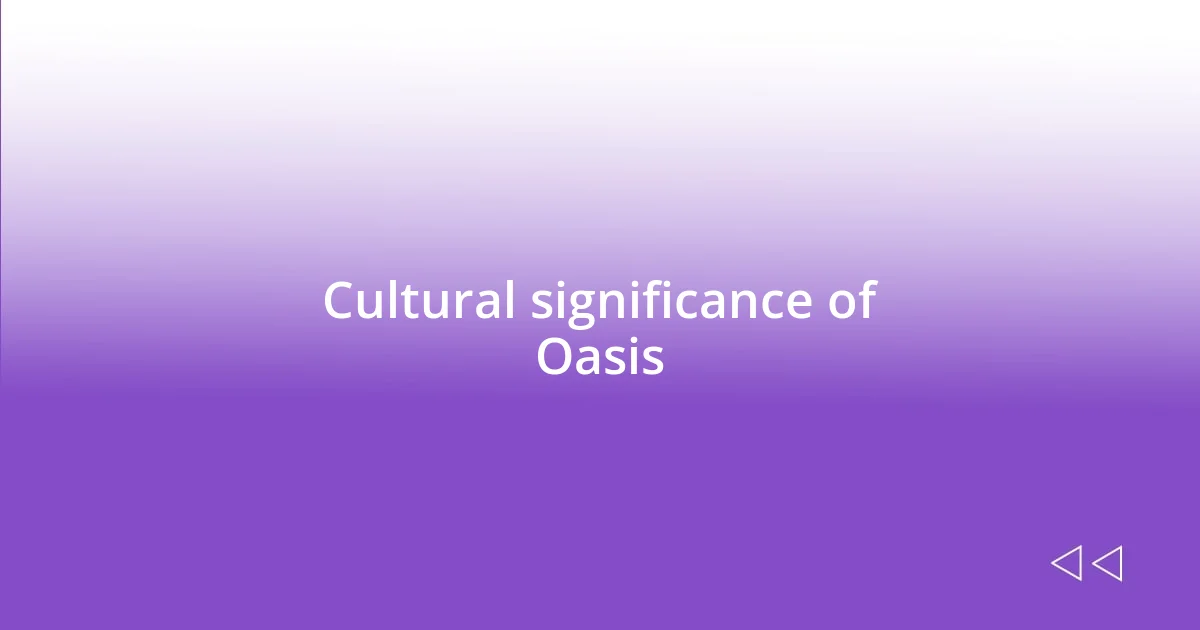
Cultural significance of Oasis
Oasis carved a unique space in the cultural landscape of the 90s, tapping into the psyche of a generation. I remember how their music often became a soundtrack to our lives, providing the perfect backdrop for everything from late-night conversations to road trips. It was as if their songs encapsulated the very essence of youth, rebellion, and discovery.
Their influence went beyond just music; Oasis sparked a cultural movement that embraced the working-class ethos and nostalgia for simpler times. I still think back to the countless evenings spent at pubs with friends, where “Don’t Look Back in Anger” ignited spontaneous sing-alongs. How powerful it was to witness how a single song could unite people, transcending age and background, and creating a sense of community—or perhaps, a shared experience.
The band’s raw, unapologetic approach also served as a mirror to societal issues and personal struggles. Listening to “Champagne Supernova” often evokes a deep sense of longing within me, making me ponder the fleeting nature of life relationships. Isn’t it fascinating how music has the power to reflect our innermost thoughts and connect us through shared sentiments? In many ways, Oasis didn’t just deliver powerful lyrics; they offered a space for reflection and understanding that resonated across countless lives.
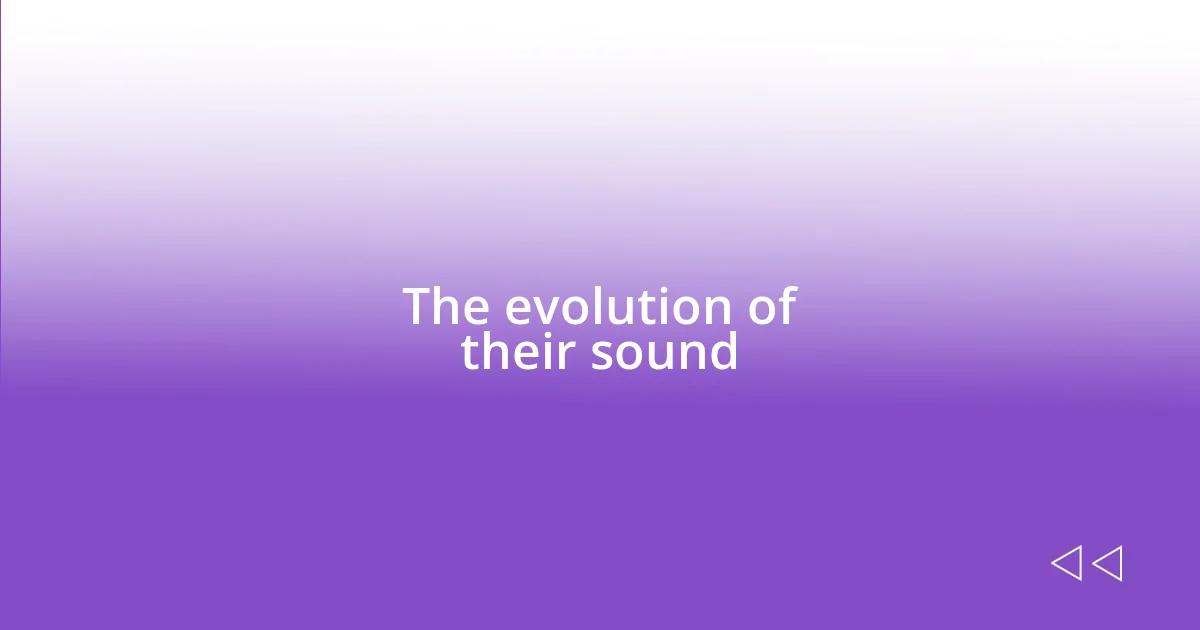
The evolution of their sound
As I listen to Oasis’s discography, I can’t help but notice how their sound evolved over the years. Their early work, like “Definitely Maybe,” was characterized by a raw, garage rock vibe, which blended melodic hooks with gritty grit. This straightforward approach captured the energy of youth and rebellion that resonated with me during my own formative years. I remember blasting “Supersonic” in my car, feeling that rush of adrenaline as the drums kicked in.
Gradually, I sensed a shift in their music. The album “Morning Glory” introduced a more polished sound yet retained anthemic qualities, with lush production enhancing the emotional depth of tracks like “Wonderwall.” I can recall the first time I heard it at a party; the room lit up as everyone joined in with the chorus, creating an electrifying moment of unity. It really made me appreciate how their evolution invited listeners to grow alongside them, adapting to the changes in our own lives.
By the time they reached “Standing on the Shoulder of Giants,” their sound had evolved once more, exploring more experimental elements and darker themes. It was as if they were cautioning us that while life can be spectacular, it’s also filled with complex emotions. I remember reflecting on the lines of “Go Let It Out”—feeling both invigorated and contemplative. Oasis’s evolution reflected the highs and lows we all experience, reminding us that change is inevitable, but there’s beauty in the journey. Isn’t it intriguing how a band’s growth can mirror our own personal tales?
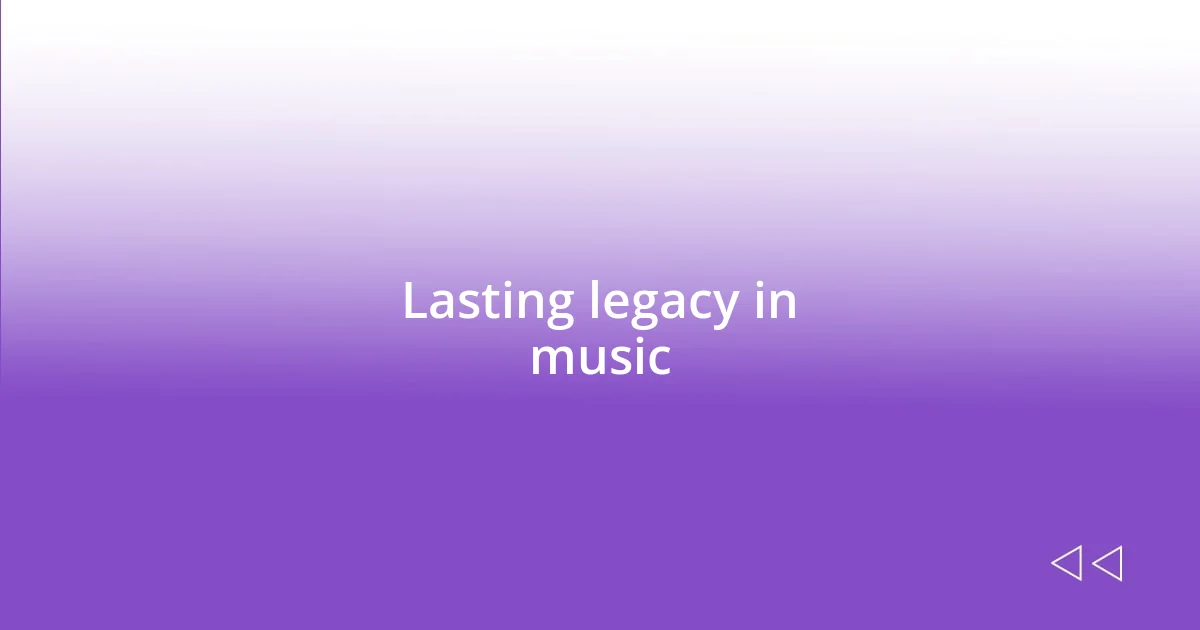
Lasting legacy in music
Oasis left a profound mark on the landscape of modern music, intertwining their anthems with the identity of a generation. Songs like “Live Forever” became not just chart-toppers but declarations of hope, resonating deeply with my own sense of ambition and desire for something greater. Every time I hear that opening guitar riff, I’m transported back to a time when we thought anything was possible; it felt like the essence of youthful optimism captured in melody.
Their ability to blend rock with lyrical introspection reshaped how we experienced pop culture. I remember one summer afternoon, listening to “Slide Away” on repeat, feeling an overwhelming sense of nostalgia wash over me. That track, with its poignant lyrics and soaring instrumentation, encapsulated the bittersweet reality of growing up. It’s no surprise that artists today cite Oasis as a major influence—after all, they transformed storytelling within music, inviting listeners to reflect on their own lives. Can a single song truly create a legacy? Oasis proves that it can, through moments of connection that linger far beyond the final note.
Moreover, the band’s fearless attitude towards their craft inspired countless musicians to embrace authenticity. I often think about how their raw sound and unfiltered lyrics paved the way for a new generation of bands, encouraging them to write from the heart rather than adhere to commercial norms. It’s a powerful reminder that art does not need to be polished to resonate; sometimes, it’s the grit and honesty that give music its lasting power. Isn’t it incredible to consider how Oasis’s legacy continues to shape our musical landscape today?
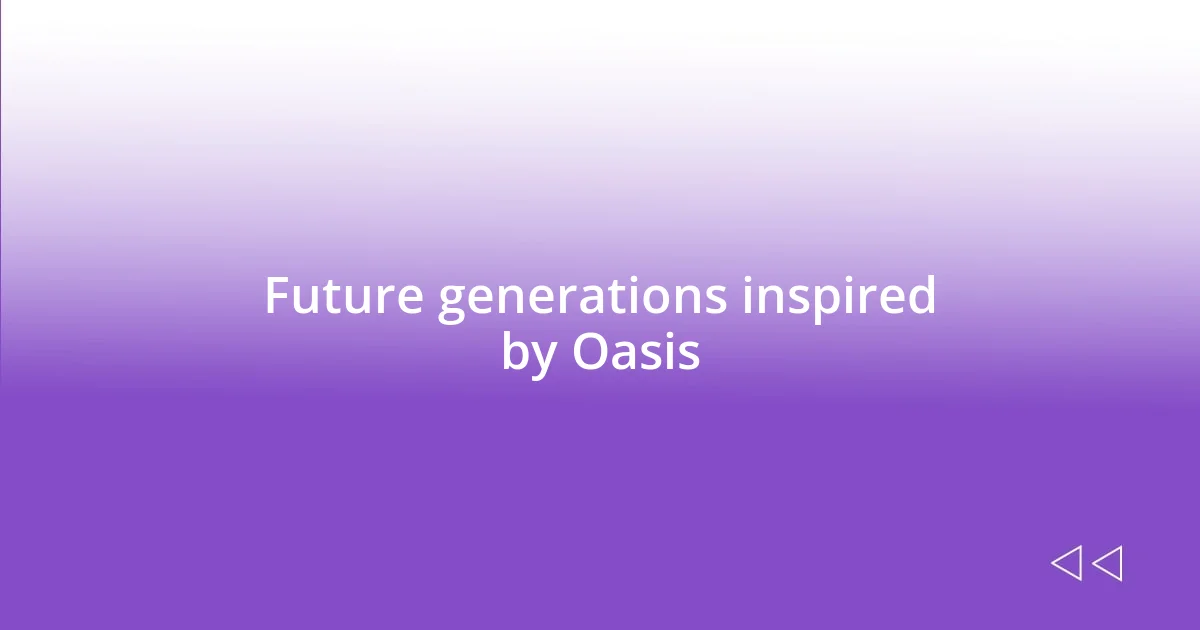
Future generations inspired by Oasis
Future generations are undoubtedly inspired by Oasis’s ability to convey timeless themes of hope and resilience. I recall watching young artists in local music venues pour their hearts out while performing covers of “Wonderwall.” The way their faces lit up during the chorus reminded me of how anthems like those serve as both a bridge to the past and a launchpad for new journeys. It’s fascinating how these songs connect people across generations, making them feel seen and understood.
When I think about the aspiring musicians today, it’s clear that Oasis’s influence is woven into their fabric. I remember attending a music festival where a band performed “Champagne Supernova.” As the crowd sang along, the moment felt electric, almost as if we were all part of a collective memory. It struck me that Oasis’s music doesn’t just entertain; it inspires creativity and camaraderie. Is there anything more beautiful than a shared experience through song?
Moreover, Oasis’s unapologetic embrace of authenticity resonates deeply with the younger crowd. I’ve seen social media brimming with tribute videos and heartfelt covers that speak to how these songs empower individuals to tell their stories. It’s a reminder that music can be a channel for self-expression and healing. As I watch this evolution unfold, I can’t help but wonder: What new stories will future generations tell, inspired by the legacy of Oasis?



